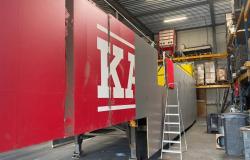The Belgian flag is still flying proudly in front of the Van Hool factory site on Thursday, when Blerin (38) pushes his sick report through the letterbox at the entrance gate of his employer. He has no intention of brushing aside his back pain out of loyalty any longer, he says, visibly exhausted. Because for whom? The iconic Van Hool family business, whose buses transported generations of Belgians, is likely to be declared bankrupt next week. “I just don’t feel like it anymore.”
Van Hool is a household name in Belgium and in the passenger transport industry worldwide. Did you go on a skiing holiday or a school trip by bus from Belgium? Then there was a good chance that a Van Hool bus would take you to your destination. The impending bankruptcy therefore not only caused a stir among the 2,400 Flemish employees. The endless resuscitation attempts were widely reported in the Belgian press last month. And one question was constantly hanging in the air: will the family feud be settled in time?
About the author
Iva Venneman is foreign editor of de Volkskrant. She writes about Germany and Belgium, among other things.
It is common knowledge in Belgium that the Van Hool family, despite or because of the family business, has been at loggerheads for years. It seems that the company’s founder, the late Bernard van Hool, has something to do with himself. “He believed that only his sons should be allowed to work in the company,” the daily wrote The standard. In his inheritance he therefore gave his eight sons each a share in the company. His two daughters had to make do with real estate.
When three of the eight brothers sold their shares 25 years ago, a fight arose over the inheritance. According to the sisters, they would have collected three times as much money as they had ever had. Since then, the family has met numerous times in court to discuss this inheritance issue.
The female line – one of the sisters is now dead, but her son continues the fight – achieved modest success. 60 percent of the shares were placed under a so-called ‘sequestration’. This means that they cannot simply be sold, which prevented a takeover of the company. The bickering is also said to have scared off investors. But even now that bankruptcy was hanging over the market, the quarreling family members could not reach an agreement.
‘A smack’
In Koningshooikt, the village to which the extensive factory site is attached, all residents know that the inevitable is about to happen. Yet. “It will be a blow when the time comes,” says Sanne Scheurweghs (52), who is drinking her cup of coffee at the counter of the village pub Jong Jut.
The village, its four thousand inhabitants and the company seem to have grown together after 77 years. Scheurweghs hears the buzz in the factory hall in the afternoon when it is lunch time. And she knows that the company tests the fire alarm every first Thursday of the month. “We are just a small village,” she clarifies. ‘Van Hool is Koningshooikt, and Koningshooikt is Van Hool.’
Van Hool managed to distinguish itself from other bus builders because the company did not do mass production, the employees said when they left the site on Thursday. The parts came from other manufacturers or were made in-house. Each vehicle could therefore be designed entirely according to the customer’s wishes, which is also reflected in the selection of coaches, which can still be seen behind the gates in the parking lot. It is precisely because of this customization that Van Hool was considered a popular manufacturer for many years.
Missed boat
The fact that the company got into trouble about three years ago had several causes, says Bart Van Craeynest, chief economist at the Flemish employers’ organization Voka. The company has bet on the wrong horse when it comes to sustainability. “They have stuck with hydrogen for too long, instead of electrification,” he says. “That’s why they missed the boat a bit.”
In addition, Van Hool has faced a typically Belgian problem in recent years: rapid wage increases. In Belgium, unlike in the Netherlands, wages are automatically adjusted for inflation. “As a result, personnel costs increased rapidly from 2020,” says Van Craeynest. In other European countries, such an inflation correction usually also happens, but only later. ‘That gives the Belgian industry a handicap.’
Van Hool has also always wanted to keep a large part of its production process in Belgium. “The family would always have found that very important,” says the Voka chief economist. ‘Only ten years ago’ part of the production process moved to North Macedonia. The corona crisis, a period in which demand for buses virtually came to a standstill, proved to be the death blow for the company. De Lijn, the Flemish public transport company, even ordered new buses from China at the beginning of this year.
Restart
Marc Zwaneveld, crisis manager at Van Hool, is still in discussions with three parties about restarting the company. The first party is an alliance between the German Schmitz Cargobull and the Dutch bus builder VDL Groep, the Flemish newspaper reported The time. The second is the Flemish entrepreneur Guido Dumarey. The third party is still unknown, but it is said to be a smaller party. A final decision on the company’s future should be made next week.
Paul Wouters (65), who stands behind the bar of his café Jong Jut, has doubts about a possible restart. Like many fellow villagers, he worked for Van Hool for years. But those were different times, he says. ‘People used to ask when they booked a bus trip to Spain: do the seats have leather upholstery and luxurious suspension, and does it have a TV screen?’ According to him, travelers now want to get from A to B as cheaply as possible. ‘And if you want that, you will end up with the Chinese. Not at Van Hool.’
Tags: Family feud typical Belgian problem wipe jobs Flemish bus manufacturer
-






